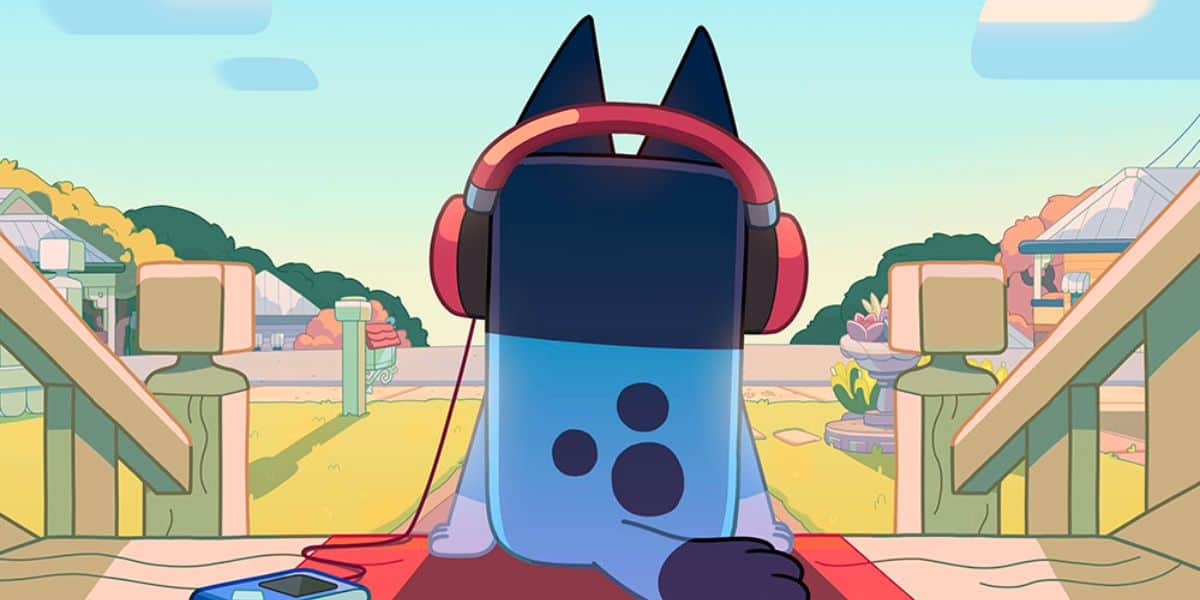If you have either a Disney+ subscription, a small child in your house, or very possibly both, you’ve undoubtedly heard the name “Bluey.” The little blue heeler from Ludo Studios has grabbed the world by the heartstrings for over 150 episodes, but the show intended for young viewers has far surpassed its intended audience.

Whether intentionally or not, Bluey has amassed an immense adult fanbase, and it’s easy to understand why. The show’s playful nature, soothing tones, and playful antics of cartoon dogs are nothing short of infectious, but those benefits aren’t strictly limited to the kids in the room.
Related: ‘Bluey’ Needs Trauma to Stay Popular
With the show’s attention to the parent and adult characters like Bandit and Chilli, Bluey has clearly been created with adults and their children in mind. However, a recent report from The Huffington Post reveals that not only are more adults tuning in, but the series has some much-needed psychological benefits as well.
The Healing Power of Bluey

The series is notorious for its emotionally charged flavor, and many episodes contain messages meant more for parents than their young ones watching. However, the surprisingly adult appeal recently got the attention of The Huffington Post, which reported how healing the show has been for grownups (with and without children).
Related: ‘Bluey’ Threatens ‘Oppenheimer’ with New Release
Writer Marilyn La Jeunesse shared a report that Bluey has become instrumental in healing childhood wounds, and it’s hard to deny that statement when the writer herself admits to being a full-fledged Bluey buff.
La Jeunesse writes,
Full of curiosity with an endless imagination, Bluey and her little sister, Bingo, find new ways to entertain themselves while learning about life, family and happiness. From crafting a world that doesn’t talk down to kids to making childless adults feel heard and validated, “Bluey” is the epitome of what a comfort show is, no matter your age. It’ll teach you to be unafraid of playfulness, to reconnect with your inner child, and stand up for yourself.
It’s an apt descriptor of Bluey if there ever was one, but the assessment also unpacks why adults are so attached to Bluey, Bingo, and the rest of their cartoon canine crew.

The report shares the thoughts of psychologist Dr. Tamara Soles, who shows just what kind of an impact the “comfort show” has had on its viewers apart from making them better parents.
“For some though, watching adult characters in children’s shows allows them to have a corrective experience… They may not have had adults who were as emotionally attuned as many of the adults in children’s shows. Exploring universal themes as well as a wide range of emotions, children’s shows often validate emotional experiences, and provide a way for so many of us as adults to be seen and to reflect on our own emotional responses.”
The claim above is undoubtedly valid, especially amongst the parents in the audience who repeatedly compare themselves to Bandit and Chilli as they raise Bluey and Bingo. However, Dr. Soles also addresses a much bigger picture when she adds that Bluey provides a much-needed escape from “the complexities of everyday adult life.”
“Particularly for adults who are strongly emotionally impacted by the myriad atrocities around the world, watching a short children’s show with a clear morale and ethically-guided adults, can be a healing respite for many. Watching high-quality children’s programming is like entering a world that feels calm and simple…”
To put it in some familiar perspective, fans watch Bluey for the same reason many of us are continuously engrossed in the realm of Disney’s animated features. We want a safe and secure environment where conflicts are resolved, the good guys win, and the stories end with a kiss. The difference between Disney’s and Bluey’s narratives is that not only are the show’s problems relatable, but they are also realistically resolved.

Unfortunately, not all of us will come from a family like Bluey’s, but the show does present a way to combat obstacles when they arise. We might not all engage in regular games of Featherwand or Keepy Uppy, but many of us know what it’s like to struggle with our mental health, face conflict with our friends, and cope with the loss of a loved one.
Related: Jonas Brothers Jam with Bluey: Possible Crossover Soon
As Bluey and Bingo improve their problem-solving skills and emotional regulation, so do the viewers of all ages who tune in. Its intended audience might pick up on the lessons after enough Disney+ binging, but it’s safe to say that the adults in the room quickly outnumber them.
Have you experienced any Bluey benefits? Let Inside the Magic know in the comments down below!
